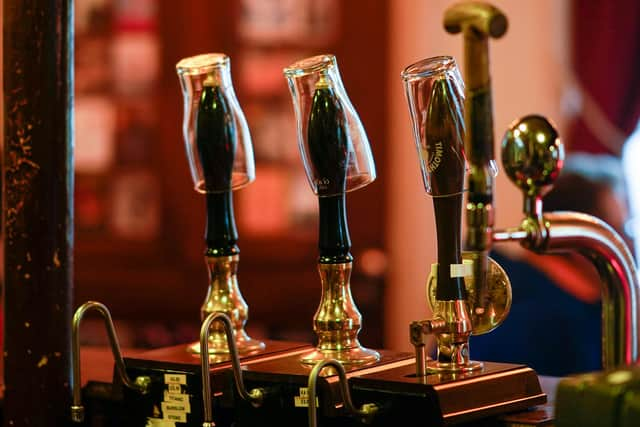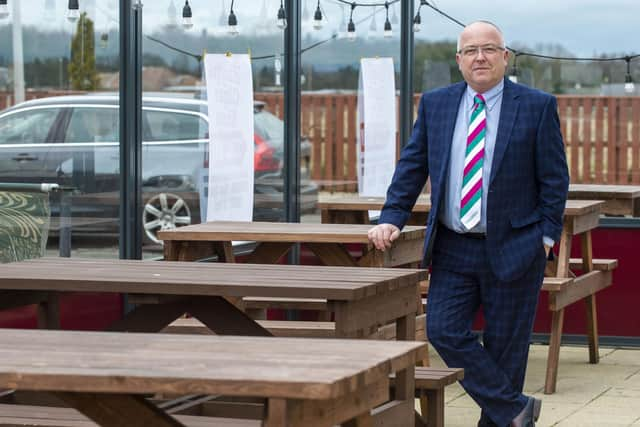Scottish hospitality sector warns of winter closures after Jeremy Hunt's Autumn Statement did 'nothing to help'
With pubs, restaurants, and hotels facing steep utility costs, and rising wage and food bills, there is growing anger at Mr Hunt’s decision not to maintain the 20 per cent VAT rate, and to reverse the freeze on alcohol duty. Many in the hospitality sector argued that such decisions have imperilled an industry already struggling to cope.
In the run up to the Autumn Statement, a petition urging Mr Hunt to slash VAT by half had garnered more than 5,000 signatures. It argued that the current tax system was disproportional, and warned that unless change was implemented, there was a risk that a “large proportion” of businesses would go under
Advertisement
Hide AdAdvertisement
Hide AdIn the end, however, Mr Hunt did not budge. During his address to the Commons, he acknowledged that the VAT rate was already more than twice as high as the EU average, but said it would remain at 20 per cent until March 2016. Instead, he offered a sweetener by retaining employment allowance at £5,000 meaning employers can reduce their annual National Insurance liability.
For many businesses riding the economic storm, however, Mr Hunt did not go far enough. Some in the hospitality industry cautioned that, as a result, they were left in a downward spiral.
The Scottish Licensed Trade Association said Mr Hunt’s statement did “little” to instil confidence that brighter days are on the horizon, and warned that “the future is grim.”
Colin Wilkinson, the association’s managing director, said: “We already know from a recent survey that we conducted that some pubs and restaurants are considering closing over the winter period because they are unable to absorb recent sharp increases in energy bills at a time when they are recovering from the pandemic and still paying off debts incurred during Covid.
“We’re really concerned about the future of the industry. We need a lifeline - more needs to be done to help the struggling hospitality sector through the winter months.


“Businesses are already closing or reducing their opening hours - the chronic shortage of staff as a result of Brexit is contributing to that – but we predict further closures. We have previously called for business rates relief and a reduction in VAT for hospitality businesses – both would help in a small way.
“The reversal of the freeze on alcohol duty will also hit businesses and customers alike with the cost of a pint increasing by more than just inflation.”
Indeed, individual businesses attested to the growing pressures faced by the sector. Russell Imrie, managing director of Queensferry Hotels, which owns and operates the Best Western Plus Keavil House Hotel in Dunfermline, summed up the stark reality facing the industry.
Advertisement
Hide AdAdvertisement
Hide Ad“Hospitality businesses will decide that they have no option but to increase prices, which means they will be less busy, which means less tax to the government, and less paid hours for team members,” he tweeted.


Amid speculation over what steps the Scottish Government will take to support businesses in next month’s Scottish budget, Mr Imrie urged ministers to abandon plans to empower councils to roll out local visitor levies, better known as a tourist tax. He pointed out that the country was in a recession, with the tourism and hospitality sector “on its knees.” Pressing ahead with the levy at such a time, he said, would be “absolute madness.”
Leon Thompson, executive director of trade group, UK Hospitality Scotland, said that hospitality businesses were on the “front line” of the economic challenges, hit not just by increases in the cost of doing business, but the cost of living crisis impacting on its customers.
He said it was crucial that the Scottish Government used the £1.5bn in Barnett consequentials stemming from the additional spending to help struggling businesses. Deputy first minister John Swinney, who claimed the Autumn Statement demonstrated how people across Scotland are “paying a steep price for the economic mismanagement of the UK government,” has said the Scottish Government would carefully consider the changes and set out its response in its December budget.
But Mr Thompson said: “With a third of our members concerned about business survival this winter, it is imperative that the Scottish Government allocated support on business rates quickly.
“This move will make the difference between survival or closure for hospitality venues across Scotland. This vital support in the Scottish Budget can help to secure the future of businesses and the jobs so many people depend on.”
Further afield, the Federation of Small Businesses’ Scotland (FSB) said Mr Hunt’s lack of action on VAT effectively amounted to a “real terms cut” at a time when many businesses are fearful for their future.
Andew McRae, the FSB’s policy chair, said: “Small businesses have spent months watching their margins vanish due to rampant inflation. It’s alarming, therefore, that the VAT threshold will be held at £85,000 - a real terms cut - which will see more small traders dragged into the system against their will.
Advertisement
Hide AdAdvertisement
Hide Ad“Businesses, like households, are extremely anxious about sharp, unaffordable rises in their energy bills. The government must publish details about what support firms can expect when the initial term of the energy bills relief scheme comes to an end in April. Any targeting has to be based on business size, not particular sectors.”
Liz Cameron, chief executive of the Scottish Chambers of Commerce, said “not nearly enough” was done by Mr Hunt to tackle labour shortages, which she described as “one of the single biggest challenges facing businesses.”
She added: “Until such times as domestic workforce schemes start to pay dividends, we urge the UK government to align immigration policy with economic need and open more accessible routes for businesses to fill skills shortages and labour market gaps.”
Comments
Want to join the conversation? Please or to comment on this article.